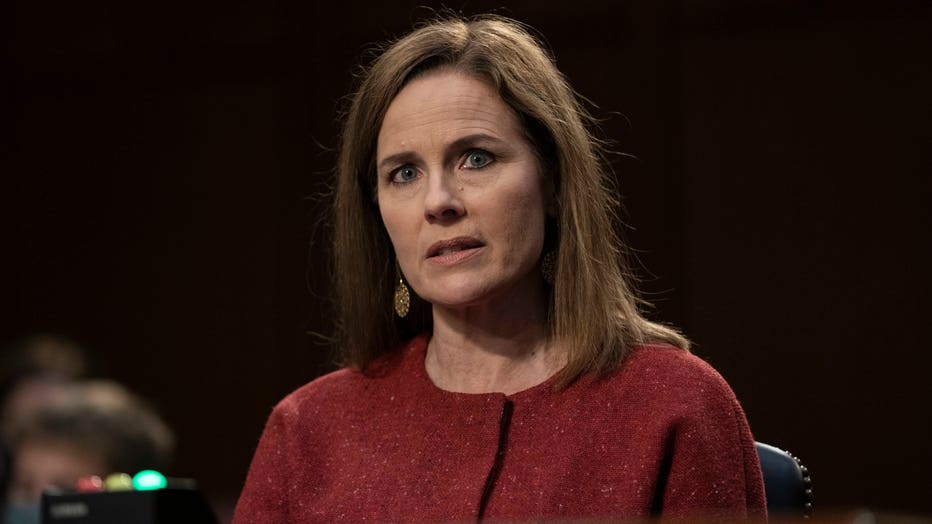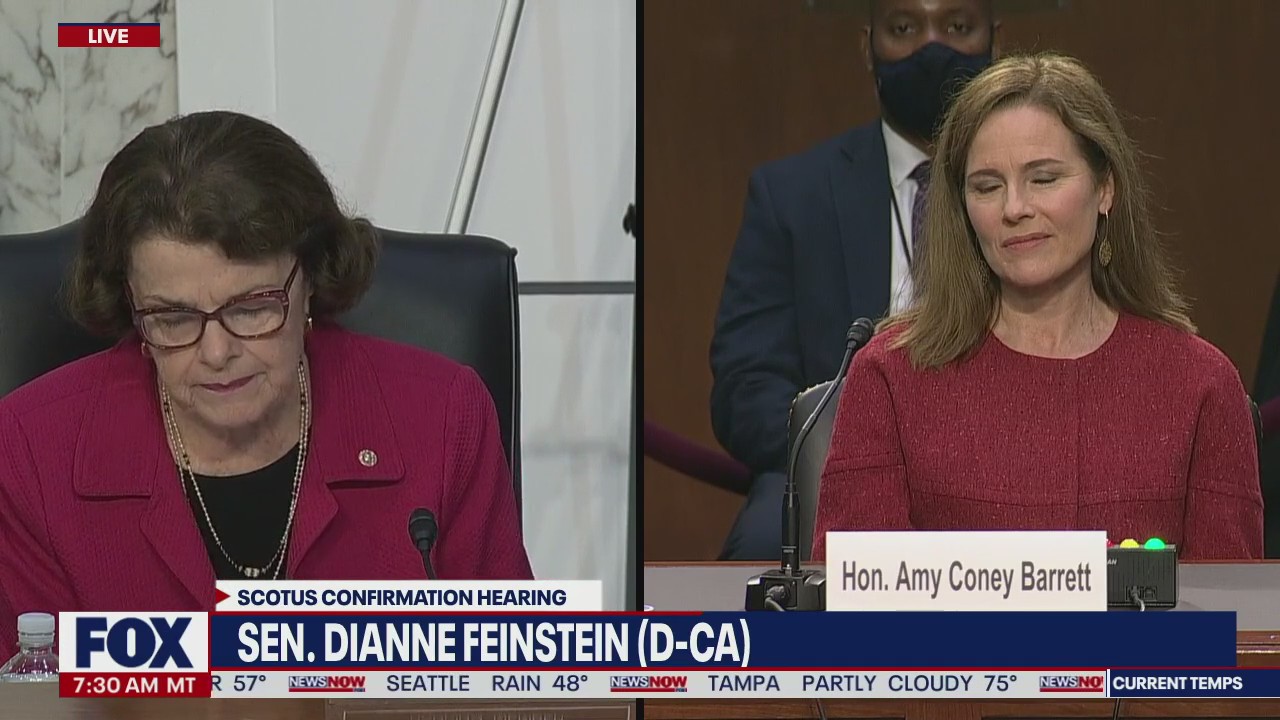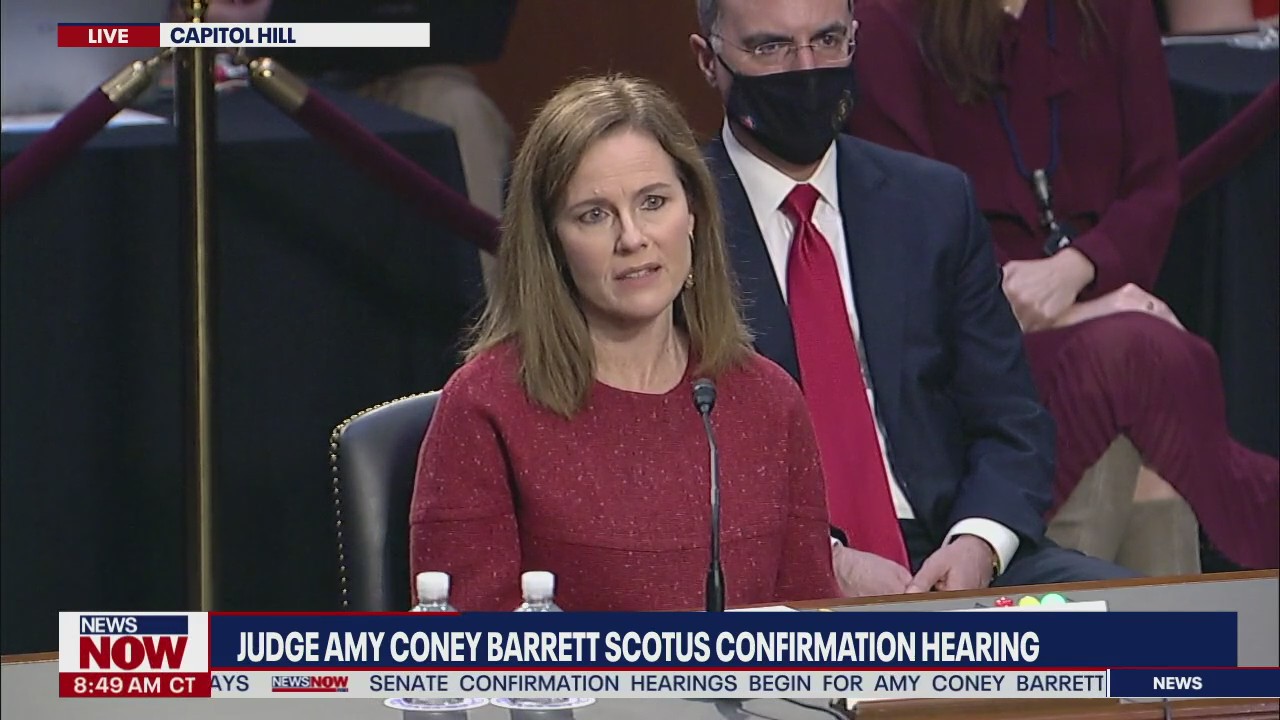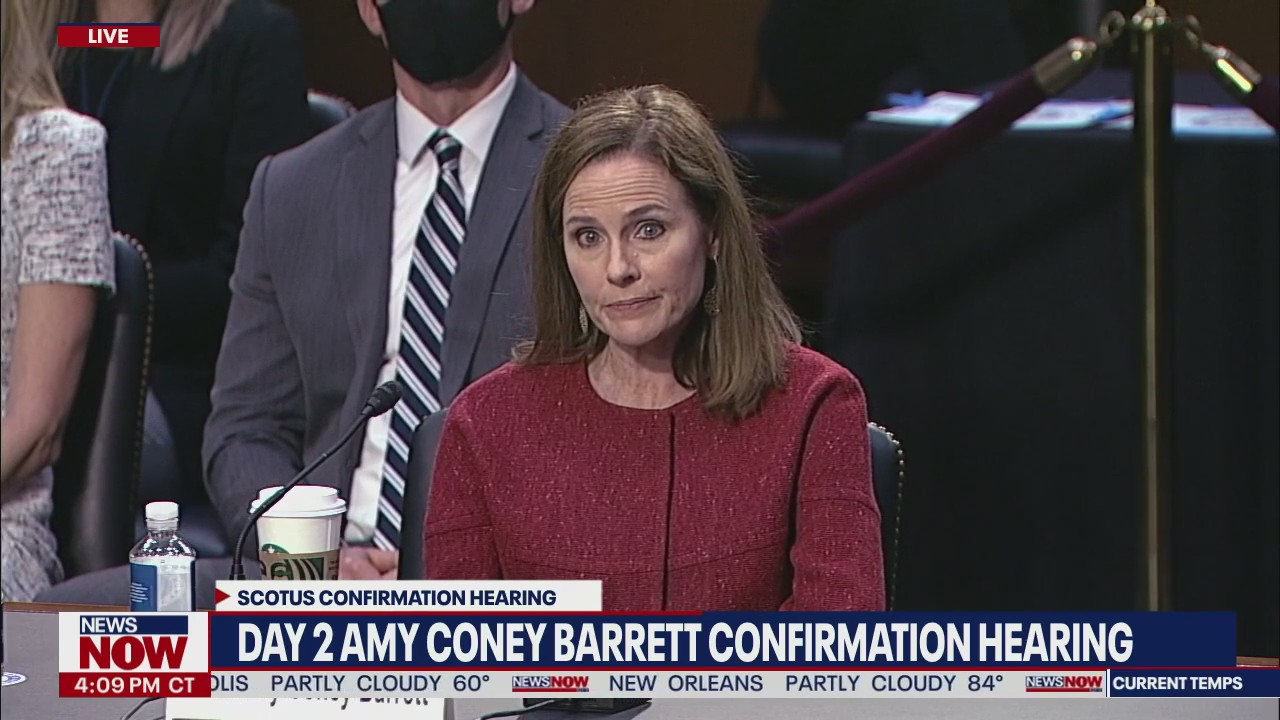Amy Coney Barrett: Supreme Court nominee vows no personal agenda on 2nd day of hearings
WASHINGTON - The second day of confirmation hearings for Supreme Court nominee Amy Coney Barrett finished after nearly 12 hours.
Senate Judiciary Committee members began questioning Supreme Court nominee Barrett Tuesday — covering a range of topics from health care, to her Catholic faith, to the presidential election.
Barrett remained neutral on many issues, asserting that she could not say whether she would overturn the Affordable Care Act or how she would vote on other politically fraught issues, including abortion.
GOP senators are quickly moving to confirm Barrett ahead of the 2020 presidential election on Nov. 3. Barrett was nominated by President Donald Trump just days after the death of Supreme Court Justice Ruth Bader Ginsburg on Sept. 18.
She will be questioned again by senators on Wednesday.
On Tuesday, Barrett vowed to bring no personal agenda to the court, saying she would decide cases as they come.
“I made no promises to anyone,” Barrett said. “I have no agenda.”
Barrett’s children attended their mother’s Senate confirmation hearing on Tuesday. A White House official said Barrett is tested daily for COVID-19 and that her children had also recently tested negative for the virus, though the official declined to provide the dates of those tests, the Associated Press reported.
The 48-year-old federal appeals court judge said she is an "originalist" when it comes to interpreting the U.S. Constitution, meaning she believes that the meaning of law does not change over time. And though she has been compared to her mentor, the late Justice Antonin Scalia, Barrett said she would serve with her own perspective and experience on the high court.
"I interpret its text as text, and I understand it to have the meaning that it had at the time people ratified it. So that meaning doesn't change over time, and it's not up to me to update it or infuse my own policy views into it," Barrett said.
She declined to say whether she would recuse herself from any election-related cases involving President Donald Trump, who nominated her to fill the seat of the late Justice Ruth Bader Ginsburg and is pressing to have her confirmed before the the Nov. 3 election.
“Judges can’t just wake up one day and say I have an agenda — I like guns, I hate guns, I like abortion, I hate abortion — and walk in like a royal queen and impose their will on the world,” Barrett told the Senate Judiciary Committee.
Barrett added that it’s a violation of the judicial independence to put a justice on the court as a means of obtaining a particular result, and that she has not been asked by Trump or anyone else how she’d rule in possible upcoming cases.

Supreme Court nominee Judge Amy Coney Barrett arrives to testify before the Senate Judiciary Committee on the second day of her Supreme Court confirmation hearing on Capitol Hill on Oct. 13, 2020 in Washington, D.C. (Photo by Shawn Thew-Pool/Getty Im
Trump has said he wants a full nine-member court in place for any disputes arising from the heated election with Democrat Joe Biden.
But Barrett, when pressed on the issue by Sen. Chris Coons, D-Del., said she would not allow herself to be used as a “pawn” in any decision over a disputed election.
"I certainly hope that all members of the committee have more confidence in my integrity than to think that I would allow myself to be used as a pawn to decide this election for the American people," Barrett said.
RELATED: What happens if 2020 election is contested? Here are possible scenarios
Republicans, who control the Senate, have been pushing forward to secure Trump's nominee and hear a high-profile challenge to the Affordable Care Act, which will be heard Nov. 10, as well as any election related challenges. Meanwhile, Democrats had been looking for ways to delay the fast-track confirmation.
California senator and Democratic vice presidential nominee Kamala Harris questioned Trump’s Supreme Court pick Tuesday via video, focusing primarily on the Affordable Care Act.
“The Supreme Court could be just one vote away from overturning the Affordable Care Act and all of its protections, including for everyone who has a pre-existing condition or may ever get a pre-existing condition.” Harris said.
“The Affordable Care Act and all of its protections hinge on this seat and the outcome of this hearing,” Harris said.
Harris asked Barrett whether she was aware of Trump’s statements committing to nominating judges who would strike down the Affordable Care Act prior to her nomination.
Barrett responded, “I don’t recall hearing about or seeing such statements.”
Barrett later said Democratic senators may have referenced Trump’s comments during conversations after her nomination, but prior to her confirmation hearings.
“When I had my calls with senators, it came up. Many of the Democratic senators wanted to know about the Affordable Care Act and to satisfy themselves that I had not made any pre-commitments to the president about it,” Barrett said.
Harris also noted that Barrett wrote an article critical of the Supreme Court’s decision to uphold the Affordable Care Act five months before Trump nominated her to an appellate court in May 2017.
Earlier in the hearings, Barrett said an article she wrote criticizing Chief Justice John Roberts’ 2012 opinion saving the Affordable Care Act does not reflect any “hostility” toward the law.
Coons brought up the article she wrote in 2017 before she became a judge that said Roberts had “pushed the Affordable Care Act beyond its plausible meaning to save the statute.”
The court will hear a new case in November that could overturn it, but Barrett said that case is very different, and her “critique of the reasoning” in the previous case does not mean she doesn’t like the law. “I can promise you that’s not my view, that’s not my approach to the law,” she said.
Senate Judiciary Committee Chairman Lindsey Graham, R-S.C., who is presiding over the hearings, asked Barrett about being compared to Scalia, even being dubbed by some as a “female Scalia.”
"I would say that Justice Scalia was obviously a mentor, and as I said when I accepted the president's nomination, that his philosophy is mine, too," Barrett answered. "He was a very eloquent defender of originalism."
She continued: "But I want to be careful to say that if I'm confirmed, you would not be getting Justice Scalia, you would be getting Justice Barrett. And that's so because originalists don't always agree."
Barrett also told Graham that she “can” set aside her Catholic beliefs and has done that since her confirmation as an appeals court judge in 2017.
On Tuesday, the 22 senators on the committee were each allotted 30 minutes to question Barrett before a second round of 20-minute follow-up questions.
On the topic of abortion, Barrett said she signed a statement in 2006 opposing “abortion on demand” on her way out of church and “in my personal capacity,” separate from her current status as a federal judge, according to the Associated Press.
The 2006 statement, which Barrett did not initially include in materials provided to the Senate Judiciary Committee in advance of her confirmation hearings this week, has raised questions for some critics about whether the appeals court judge can separate her personal views from her judicial decision-making.
Democratic Connecticut Sen. Richard Blumenthal asked Barrett if the Constitution protects a woman’s right to have an abortion and whether it would be a crime for doctors to provide abortions. “I cannot publicly express views,” Barrett responded. “We cannot answer questions in the abstract.”
Barrett also declined to say whether she views the criminalizing of in vitro fertilization as constitutional, describing it as an abstract question.
The 2006 statement Barrett signed didn’t address IVF, but the Indiana group that circulated the statement has also criticized the medical fertility procedure.
Democratic Sen. Tammy Duckworth of Illinois urged her colleagues to reject Barrett’s nomination, citing her daughter’s conception using the common reproductive technology.
Sen. Dianne Feinstein, D-Calif., discussed the issue of abortion and pressed Barrett on whether she thinks Roe v. Wade was wrongly decided — the landmark Supreme Court case which protects a woman’s right to choose to have an abortion without excessive government restriction.
Barrett said she can't comment on aspects of pending cases that may come before the court.
"I completely understand why you are asking the question, but again, I can’t pre-commit, or say, ‘yes, I’m going in with some agenda,’ because I’m not," Barrett said. "I have an agenda to stick to the rule of law and decide cases as they come."
Feinstein also asked Barrett if Trump has the authority to delay the general election after floating the idea in July.
"Senator, if that question ever came before me, I would need to hear arguments from the litigants and read briefs and consult with my law clerks and talk to my colleagues and go through the opinion writing process," Barrett responded. "So if I give off-the-cuff answers I would be basically a legal pundit, and I don't think we want judges to be legal pundits."
Democratic Hawaii Sen. Mazie Hirono brought up a question posed by Feinstein to Barrett earlier regarding the Supreme Court’s 2015 decision recognizing the constitutional right to same-sex marriage.
“Even though you didn’t give a direct answer, I think your response did speak volumes. Not once but twice, you used the term ‘sexual preference’ to describe those in the LGBTQ community,” Hirono said. “‘Sexual preference’ is an offensive and outdated term.”
Hirono said that the term is used by anti-LGBTQ activists to suggest that sexual orientation is a choice, and that the LGBTQ community should be concerned.
“I certainly didn’t mean and would never mean to use a term that would cause any offense in the LGBTQ community,” Barrett responded. “So, if I did I greatly apologize.”
Sen. Cory Booker later addressed Barrett’s usage of the term ‘sexual preference,’ asking Barrett if there was a difference between sexual orientation and sexual preference.
“Senator what I’m saying is I was not trying to make any comment on it. I fully respect all the rights of the LGBTQ community,” Barrett responded. “ I reject any kind of discrimination on any sort of basis.”
Sen. Cory Booker, D-N.J., pressed Barrett on the subject of “peaceful transfer of power" in the electoral process, asking her whether a president should commit to a peaceful transition after an election.
"To the extent that this is a political controversy right now I want to stay out of it and I don't want to express a view," Barrett said.
Booker pressed further, citing examples of the founding fathers and their peaceful transfers of power. “Is that something that presidents should be able to do?” Booker asked.
“One of the beauties of America from the beginning of the republic is that we have had peaceful transfers of power,” Barrett responded. “I think it is part of the genius of our Constitution and the good faith and good will of the American people that we haven’t had the situations that have arisen is so many other countries where there have been, where those issues have been present.”
On the topic of racism, Barrett said the video of George Floyd, who was killed May 25 by Minneapolis police, was “very emotional” for her family. Barrett has seven children, including two who are Black.
"(My husband) was with the boys on a camping trip in South Dakota. So I was there, and my 17-year-old daughter Vivian, who's adopted from Haiti, all of this was erupting. It was very difficult for her. We wept together in my room."
When asked about the larger issue of racial injustice in the U.S., Barrett said that “racism persists in our country” — but "giving broader statements or making broader diagnoses about the problem of racism is beyond what I'm capable of doing as a judge."
In Monday’s opening session of the hearings, Democratic senators painted Barrett as a threat to the Affordable Care Act and many Americans' health care — while Republican senators called her a thoughtful judge and defended her credentials and record.
Barrett in her opening statement told the panel that Americans “deserve an independent Supreme Court that interprets our Constitution and laws as they are written.”
Graham told reporters late in the day that she is a “slam dunk” based on her qualifications. Barrett received the highest rating — “well-qualified” — from the American Bar Association.
Republicans appeared to have the votes to confirm the 48-year-old conservative judge to a lifetime seat on the Supreme Court, barring any major development. Barrett would move the balance of the court to a 6-3 conservative majority.
RELATED: Where does Amy Coney Barrett stand on key issues
Barrett told the Senate Judiciary Committee Monday that she is “forever grateful” for late Justice Ruth Bader Ginsburg’s trailblazing path as a woman.
“No one will ever take her place. I will be forever grateful for the path she marked and the life she led,” Barrett said. But she is resolved to maintain the perspective of her mentor, Scalia, and “apply the law as written.”
In 2017, Trump nominated Barrett to fill the vacant seat on the 7th Circuit Court of Appeals, a jurisdiction that covers Indiana, Illinois, and Wisconsin. Barrett was previously considered for the Supreme Court, among those on a list to replace retiring Justice Anthony Kennedy in 2018. Trump ultimately chose to nominate Kavanaugh.
Outside groups are pushing Democrats to make a strong case against what they call an illegitimate confirmation, when people are already voting in some states — saying the winner of the presidency should make the pick.
Graham scheduled a committee vote for 9 a.m. Thursday, the last day of hearings. Barrett’s nomination is expected to be brought up for a vote at that meeting and then delayed for a week, per committee rules.
No Supreme Court justice has ever been confirmed so close to a presidential election.
This story was reported from Cincinnati. The Associated Press contributed.





